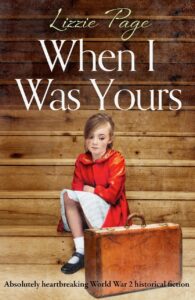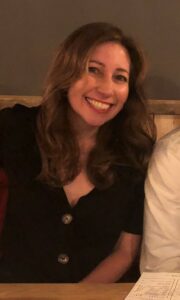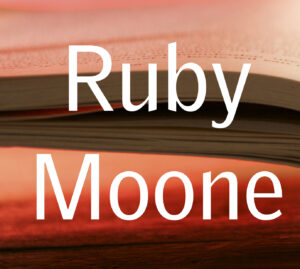Lizzie Page’s new book, When I Was Yours is now available and she is with us on the blog today to talk to us about the inspiration behind it, and to tell us more about how she came to move from writing about WW1 to WW2.
 My first novel ‘The War Nurses’ is set one hundred yards from the Western front in Ypres, Belgium and the second ‘Daughters of War’ is set mostly in a field hospital in the Somme in 1916.
My first novel ‘The War Nurses’ is set one hundred yards from the Western front in Ypres, Belgium and the second ‘Daughters of War’ is set mostly in a field hospital in the Somme in 1916.
I have spent the past few years immersed in museums, cemeteries and trenches, reading war poetry, thinking about the fight for the vote, and having extraordinary women snog, marry, then avoid cads named things like Harold or Hugo. I have fallen deeply, deeply in love with this dark period of British history. I have loved writing about this time for its momentous changes, for the restraints and for the way so much was unexpressed. This era is a gift to the novelist. If a rule of writing is you need obstacles, you need to thwart your characters: well, there were plenty of obstacles and thwarting going on during those early years of the twentieth century.
WW1 presents the back-drop to my novels, but it also, fairly effortlessly, provides the atmosphere, conflicts and tension. Win-win-win. After a long time, floundering around creating contemporary fiction that I couldn’t get to within a sniff of getting published, I finally felt that with WW1, I had found my writing home.
#Histfic #WW1 #amwriting #simple
But then, about a year ago, my editor said: (I paraphrase!) “people love your WW1 books, (she meant, they are not setting the world on fire, but those who read them tend to like them) but people really love reading about WW2. If you want to reach more people then that was the war that won…would you consider…”
This was tricky. I had built up a huge wealth of knowledge about WW1: from stockings, to baked apples, to carriages, to the… best swear words: dammit, I felt safe there, I felt confident there.
I said I’d think about it but over the next few days, I began to feel indignant on behalf of WW1. I grew offended for it. Why didn’t WW1 have bigger appeal? Why no Hollywood treatment for 14-18? Why was it always the bridesmaid never the bride? But I knew why. I had always known WW1 had less mainstream ‘allure’ as a story: it gives off the air of being a static war, unmoving, stuck in the mud. WW1 didn’t affect the home-front (actually it did) but not to the extent that WW2 did, and what’s more it has mostly gone from living memory. Plus I had always known WW2 had the glamour: it had the music, the dancing, the dashing Americans over paid and over here, it had planes (yes, so did www1 but less so) it had mass exoduses of people, it had the unimageable cruelty of the holocaust, it had antibiotics! it had The Resistance and spies, and perhaps most importantly it had good v evil, an in-built dramatic narrative, as opposed to WW1, which tends to just have the unrelenting waste of youth humming away in the back-ground. But all these factors only made me love WW1 more.
‘Poor old WW1,’ I thought, ‘sod the ‘reach’, I’m sticking with it!’
But then my husband sat me down…we had what married people call “a chat,” and not long after I emailed my editor. ‘Maybe, it could work. How about I do half and half?’
‘Do it,’ she said. (I’m paraphrasing again)
The rest, as they say, is historical fiction with a dual timeline thingy.
The first thing I realised when I started thinking about WW2 was something blindingly obvious: WW2 began only 20 years after the (official) ending of WW1. Only twenty bloody years! It’s nothing. Twenty years ago, Bill Clinton was president, and Harrison Ford was a young buck of 56 and we were partying like it’s 1999 and gearing up for the millennium. (Actually that feels like a long-time ago, doesn’t it?) Ho hum.
Still, as soon as I got my head around this, – only twenty years! – I knew what I wanted to write about: a woman who served in the Great War – that war to end all wars – who then served in the second in a different undefined way. She might easily be about the age I am now (late 40’s) Things that happened to her in WW1 would, of course, impact hugely on how she coped with WW2. And how about having her in a relationship in WW1 – that comes back to haunt her later? Hmm.
This is the way I tend to work: I find a woman from history who appeals to me – there are zillions – and then I broadly fictionalise their story. In my first novel, it was war nurses Elsie Knocker and Mairi Chisholm, in my second it was nurse, poet and writer, Mary Borden. After a little investigation, I found my springboard: two springboards in fact: a young war-artist named Olive Mudie-Cooke (who crucially had an older sister who served with her as an ambulance driver and who I re-named Vivienne) and also American Lena Guilbert Ford who wrote the lyrics to ‘Keep the Home Fires Burning.’ (Music by Ivor Novello!)
I was off. I could do it. Two stories in one. Two wars for the price of one. WW1 AND WW2. (More work than I could shake a stick at.)
But I always knew I could do the research part, the thing that had secretly worried me was: could I care about the subject matter enough? Because that’s what writing is, really, deep-down, it’s not what you know, but what you care about. Would I grow to love WW2 – to eat, sleep and think it, in the same way that I had for WW1?
I noticed – how could I fail to notice? – how some of the rhetoric of our time, of 2018/19, is dominated by talk of WW2 and when Britain was ‘great’. This rhetoric makes me uneasy. In WW2, people pulled together and did the most marvellous things – but that doesn’t make it a marvellous time. That doesn’t make it a time we would want to go back to. 60,000 people died in the blitz alone, this country was on its knees. There were the most tremendous acts of heroism, bravery, stoicism and strength (but also acts of criminality, institutional incompetence, sexism, racism, homophobia, cruel cover-ups). I knew that if I were to write about WW2, I could only do it without the rose-tinted glasses. And soon, with this…attitude in mind, I began to obsess about it, dream about it and stalk it, (in that positive and proper way writers have when we’re writing about things we really love. 😊)
So I had my WW1 story-line and very pleased I was with that too, but I needed to work on my WW2 story-line and the connection between them. This wasn’t as complicated as I’d feared. My Dad lived through WW2 and I grew up with his stories: He had quite a rough time – he was evacuated from London to Leicester and struggled with unfamiliar food, he was locked in the cupboard when he was homesick and there was fighting among the ‘local’ children and the townies’. His sister, my Aunty Nita, by contrast, had a most amazing time: she was adored by her host parents and even requested to be adopted by them instead of returning to her own family! From an early age, I understood that evacuation could be terrible, but it could also be really good. It really was luck of the draw.
And from there I was away with the stories:
Here’s the blurb to When I Was Yours.
Vivienne Mudie-Cooke didn’t ask for an evacuee child. In fact, she’s not sure her heart can take it. So many years, so many disappointments… Vivienne’s ability to love left when she learned the truth about her husband Edmund, and when she made the worst decision of her life and left her cherished sister, Olive, to her fate. But like it or not, the child, Pearl is here to stay, and it might be the last safe place for her.
As Vivienne learns to live with young Pearl, she discovers they have a connection that runs more deeply than she could ever have guessed – from long before Pearl was born, from deep into Vivienne’s past when she served in France in the last War. Will it be Pearl – the little girl who says so little and sees so much – who forces Vivi to confront what happened in her marriage and to the long-lost sister she loved so dearly and let fall so far, just when she needed Vivi most?
So that’s how ‘When I was Yours’ was born. Inspired by a war-artist here, a song-writer there, my Dad’s stories and a nudge from an editor. A load of pieces in a puzzle that somehow came together in the end, and hopefully you can’t see the joins – or if you can see the joins, they add rather than detract to the overall picture.
#histfic #WW1 #WW2 #amwriting
Thanks, Lizzie, that’s really fascinating. I must admit I’m a huge fan of stories set in WW1, so I share your indignance, but you seem to have come up with the perfect solution and created a great book.
Evacuees in WW2 is such an emotive subject. How do you approach your research to create realistic, believable situations that immerse the reader in the story?
It is an emotive subject. I really wanted to tackle it from the point of view of a woman who hasn’t had children who is suddenly lumbered with a bewildered and perhaps quite alien child. How would she cope? I don’t know if it’s the research that creates realistic situations. I tend to think its something else [unhelpful] Empathy maybe? I find people often find what is true to be unbelievable, and what didn’t happen to ring truer. Truth is stranger than fiction sometimes, isn’t it?
Your books have taken us from WW1 to WW2. Could you give us a hint of where your will take us next?
I’m now a complete convert to the dual timeline thing. I do wonder if that stems from insecurity – how could one time line possibly be enough? – but whatever the reason, I’m going to stick with it for Book 4. I’m basing the story on an inspirational yet forgotten woman from WW2 and I’m imagining what happened after the war, and the many complications of her modern-day family. So with this next book, I’m bidding farewell to WW1, (but I’ll be back there some day, I know it.) I’m at the planning stage – its like getting to know someone fascinating – and it’s all very exciting so far!
Thank you again, Lizzie, it’s been fantastic chatting to you. I really can’t wait to read the book and wish you all the best with it.
About the Author:
 I live with my husband and three children by the sea in South East England. And with my dog. How did I forget my dog? I enjoy traveling and lived in Paris and Tokyo for some time. I’ve had lots of different jobs from waitressing and teaching to admin and bingo-calling – but being a writer is my absolute favourite.
I live with my husband and three children by the sea in South East England. And with my dog. How did I forget my dog? I enjoy traveling and lived in Paris and Tokyo for some time. I’ve had lots of different jobs from waitressing and teaching to admin and bingo-calling – but being a writer is my absolute favourite.
Where to find When I Was Yours:
https://www.amazon.co.uk/When-Was-Yours-Absolutely-heartbreaking-ebook/dp/B07MXPXPWL/ref=sr_1_1?keywords=when+I+was+yours&qid=1555617914&s=gateway&sr=8-1
Find out more about Lizzie:
https://twitter.com/LizziePagewrite
https://www.facebook.com/lizzie.page.75
About the Interviewer:
 Ruby Moone lives in the wilds of Lancashire with her husband and writes historical and contemporary romance. At school, her teachers said that she lived with her head in the clouds and if she didn’t stop daydreaming she would never get anywhere. She never did stop daydreaming, and after years of happily living in the clouds, decided to write the stories down.
Ruby Moone lives in the wilds of Lancashire with her husband and writes historical and contemporary romance. At school, her teachers said that she lived with her head in the clouds and if she didn’t stop daydreaming she would never get anywhere. She never did stop daydreaming, and after years of happily living in the clouds, decided to write the stories down.
http://www.rubymoone.com/
https://www.facebook.com/RubyMoone/
https://twitter.com/RubyMooneWriter
https://www.instagram.com/rubymoone/
 Ruby Moone lives in the wilds of Lancashire with her husband and writes historical and contemporary romance. At school, her teachers said that she lived with her head in the clouds and if she didn’t stop daydreaming she would never get anywhere. She never did stop daydreaming, and after years of happily living in the clouds, decided to write the stories down.
Ruby Moone lives in the wilds of Lancashire with her husband and writes historical and contemporary romance. At school, her teachers said that she lived with her head in the clouds and if she didn’t stop daydreaming she would never get anywhere. She never did stop daydreaming, and after years of happily living in the clouds, decided to write the stories down.
 My first novel ‘The War Nurses’ is set one hundred yards from the Western front in Ypres, Belgium and the second ‘Daughters of War’ is set mostly in a field hospital in the Somme in 1916.
My first novel ‘The War Nurses’ is set one hundred yards from the Western front in Ypres, Belgium and the second ‘Daughters of War’ is set mostly in a field hospital in the Somme in 1916. I live with my husband and three children by the sea in South East England. And with my dog. How did I forget my dog? I enjoy traveling and lived in Paris and Tokyo for some time. I’ve had lots of different jobs from waitressing and teaching to admin and bingo-calling – but being a writer is my absolute favourite.
I live with my husband and three children by the sea in South East England. And with my dog. How did I forget my dog? I enjoy traveling and lived in Paris and Tokyo for some time. I’ve had lots of different jobs from waitressing and teaching to admin and bingo-calling – but being a writer is my absolute favourite.

